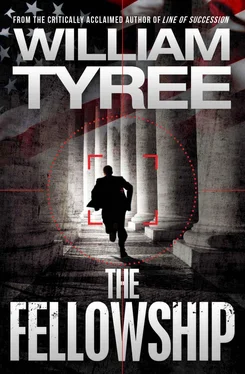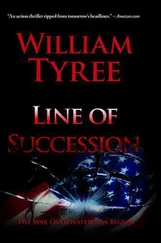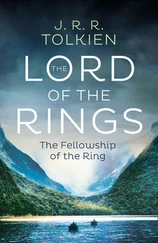William Tyree - The Fellowship
Здесь есть возможность читать онлайн «William Tyree - The Fellowship» весь текст электронной книги совершенно бесплатно (целиком полную версию без сокращений). В некоторых случаях можно слушать аудио, скачать через торрент в формате fb2 и присутствует краткое содержание. Год выпуска: 2013, Издательство: Massive, Жанр: Триллер, на английском языке. Описание произведения, (предисловие) а так же отзывы посетителей доступны на портале библиотеки ЛибКат.
- Название:The Fellowship
- Автор:
- Издательство:Massive
- Жанр:
- Год:2013
- ISBN:нет данных
- Рейтинг книги:5 / 5. Голосов: 1
-
Избранное:Добавить в избранное
- Отзывы:
-
Ваша оценка:
- 100
- 1
- 2
- 3
- 4
- 5
The Fellowship: краткое содержание, описание и аннотация
Предлагаем к чтению аннотацию, описание, краткое содержание или предисловие (зависит от того, что написал сам автор книги «The Fellowship»). Если вы не нашли необходимую информацию о книге — напишите в комментариях, мы постараемся отыскать её.
The Fellowship — читать онлайн бесплатно полную книгу (весь текст) целиком
Ниже представлен текст книги, разбитый по страницам. Система сохранения места последней прочитанной страницы, позволяет с удобством читать онлайн бесплатно книгу «The Fellowship», без необходимости каждый раз заново искать на чём Вы остановились. Поставьте закладку, и сможете в любой момент перейти на страницу, на которой закончили чтение.
Интервал:
Закладка:
He peered through the notches between the tower battlements and saw the movements of the prison workers on the distant hillside. Had Nagel been truthful when he had said they could go free at any time, if only they would renounce their beliefs and fight in the army? If so, the conviction of their beliefs was remarkable. They were doing what millions of Germans did not have the courage to do.
The noisy stomp of Nagel’s jackboots echoed up the stone staircase, then fell quiet as he reached the freshly powdered tower landing. All right arms stiffened in a salute. Nagel prowled behind them for several moments without speaking. He had not seen any of them since they had deployed to France, yet he did not offer them a general greeting.
“Wolf!” Nagel suddenly barked. “Step forward.”
His mind exploded with possible infractions. Perhaps someone had seen him at the BMW plant, using his uniform to gain access to Father Kruger. Or with Father Kruger at Ratskellar. Or perhaps it had been the way he had chastised the Hitler Youth patrol as they harassed the girl in Marienplatz. First among the Reich’s Ten Commandments would surely be Show No Pity.
He took one step, careful not to lose his footing on the icy flagstone. He felt Nagel pace behind him, and then saw him circle in front. His expression was grave.
“During the operation in Paris,” Nagel announced, “Mr. Wolf showed extreme bravery. Even while wounded, he exacted lethal force to facilitate the reichsfuhrer’s escape from a hostile environment.” Nagel opened his right fist, revealing an oval-shaped slice of black German steel. The design featured a swastika-emblazoned helmet with two swords crossed behind it. “It is with great pleasure that I now present him with the War Wound badge.”
Wolf did not breathe as Nagel unbuttoned his coat and pinned the decoration to the left breast of his tunic. He watched as the commandant stepped backwards robotically and shouted “Heil Hitler!” The unit echoed the sentiment by repeating in unison.
He had only twitched when Nagel said, “Stay where you are.”
Now he paced slowly in front of the unit. “But why was Wolf wounded at all?” he said, glowering at each of them. “Why were three of his fellow unit members killed in action? Why was the object we were to retrieve snatched out from under us?” Nagel looped behind them. “Lang? How about you? Can you tell us?”
“No sir,” Lang responded with uncertainty in his voice.
“Because the enemy was waiting for us, my boys. They knew precisely when we would arrive.”
The morning silence returned for an instant. A frozen wind blew, carrying the voices of the prison workers at the bottom of the castle. And then it was overshadowed by a light gurgling sound. A gasp. The irregular rhythm of shuffling feet.
The body of Matthias Ulrich fell out of line, collapsing face-first against the thinly dusted brickwork. The snow around him grew red and then began to melt as the hot blood rushed from Ulrich’s jugular. Nagel stepped over his body. His dagger hung loosely from his left glove, shimmering with Ulrich’s fluids.
The castle commandant turned and let the boys sweat for several moments. “Would Ulrich’s partner in crime care to confess now? I promise to forgo summary execution, and recommend a fair trial.”
There were no utterances from the ranks. Only the flapping of a swastika banner that hung from one of the battlements.
*
Matthias Ulrich was the only cadet to die atop the North Tower that morning. While the other eight surviving members of their unit were escorted downstairs, Wolf and Lang were quietly led inside the North Tower’s upper room. It had been off-limits to the unit during their six-week training, and the shaken soldiers were surprised to find a lecture hall with modern amenities. A professor presented to an audience of civilian and military Ahnenerbe leadership.
Wolf and Lang stood in the back. Cold and traumatized as they were, they were captivated by a large projection screen showing the faces of two men, an adult woman and a baby. The woman had the letters OO typed beneath her face. The men were labeled A and AB. A question mark loomed below the baby’s face.
Dr. Gustav Hahn, a plump, balding 63-year-old with a bushy, silver mustache, spoke at the podium. Wolf remembered Hahn from a conference his father had hosted at the University of Munich in 1937. He was the professor of Racial Studies at the University of Leipzig, and also headed the Society for Blood Group Research.
“In this case,” he said as he pointed a fat finger at the screen, “a question of paternity between a Jewish male and an Aryan male left some question as to whether the child could be considered German.
“Three years ago, our former colleague, Karl Landsteiner, published a paper confirming the presence of the Rh factor in all known human blood. This past summer we were able to infuse Landsteiner’s research with our own findings and determine paternity, confirming German citizenship for the child.”
The audience clapped enthusiastically. But who was Karl Landsteiner? Wolf had never heard of him.
A man in a gray suit stood and began talking about the implications of the study on government legislation. As Hahn listened, smoke rolled off the Leitz Parvo 100, a slide projector like the one Wolf himself had operated at the Reich School. Professor Hahn quickly unplugged the projector, bent over it and blew. Hahn’s breath hardly cooled the lamp — the shiny, heavy, black machine suddenly burst into flames. The audience roared with laughter as Hahn tore off his suit jacket and used it to smother the fire.
Heinrich Himmler stood, raising his arms above his head to restore order. Wolf had not noticed the reichsfuhrer sitting in the front row. “Professor Hahn,” he said, “The case study is almost as impressive as your firefighting.”
The audience laughed again, which Himmler tolerated for a moment before renewing his call for silence. “Professor, does this mean that we can now conclusively determine racial identity through blood testing?”
Hahn removed a handkerchief from his pocket and used it to wipe sweat from his neck and forehead. “Herr Himmler, I can always count on you to get to the heart of the matter. Under the right conditions, we can now identify some genetic traits commonly associated with race at about 72 percent certainty.”
“You seem very sure of your figures.”
The professor nodded. “Last year we performed a double-blind study in which we exhumed the bodies of 200 deceased prisoners. Through an examination of the bodies and interviews with those who knew them, we documented hair color and eye color. At the same time, we gave a research team only dried blood samples from the prisoners for examination, keeping them ignorant of any other information. Using the techniques we developed, the team was able to properly identify nearly all the blue-eyed prisoners and most of the green-eyed prisoners. They also properly determined hair color in a minority of the prisoners.”
The audience seemed to stop breathing as they awaited Himmler’s response. Although it was quite cold in the building, large pools of perspiration-soaked fabric were growing under the arms of Hahn’s shirt.
“While I am pleased to hear of progress,” Himmler conceded finally, “We must do better. We must strive for 100 percent capability. I ask that you conceive of an accelerated plan and submit it to my office by the end of January.”
“Yes, Reichsfuhrer.”
“And one other thing. We are never to speak of Karl Landsteiner in public again. Please make a note of it.”
Wolf leaned to whisper in his friend’s ear. “Who is Landsteiner?”
Lang shrugged. “Does it matter? We’ll never hear his name mentioned again.”
Читать дальшеИнтервал:
Закладка:
Похожие книги на «The Fellowship»
Представляем Вашему вниманию похожие книги на «The Fellowship» списком для выбора. Мы отобрали схожую по названию и смыслу литературу в надежде предоставить читателям больше вариантов отыскать новые, интересные, ещё непрочитанные произведения.
Обсуждение, отзывы о книге «The Fellowship» и просто собственные мнения читателей. Оставьте ваши комментарии, напишите, что Вы думаете о произведении, его смысле или главных героях. Укажите что конкретно понравилось, а что нет, и почему Вы так считаете.











